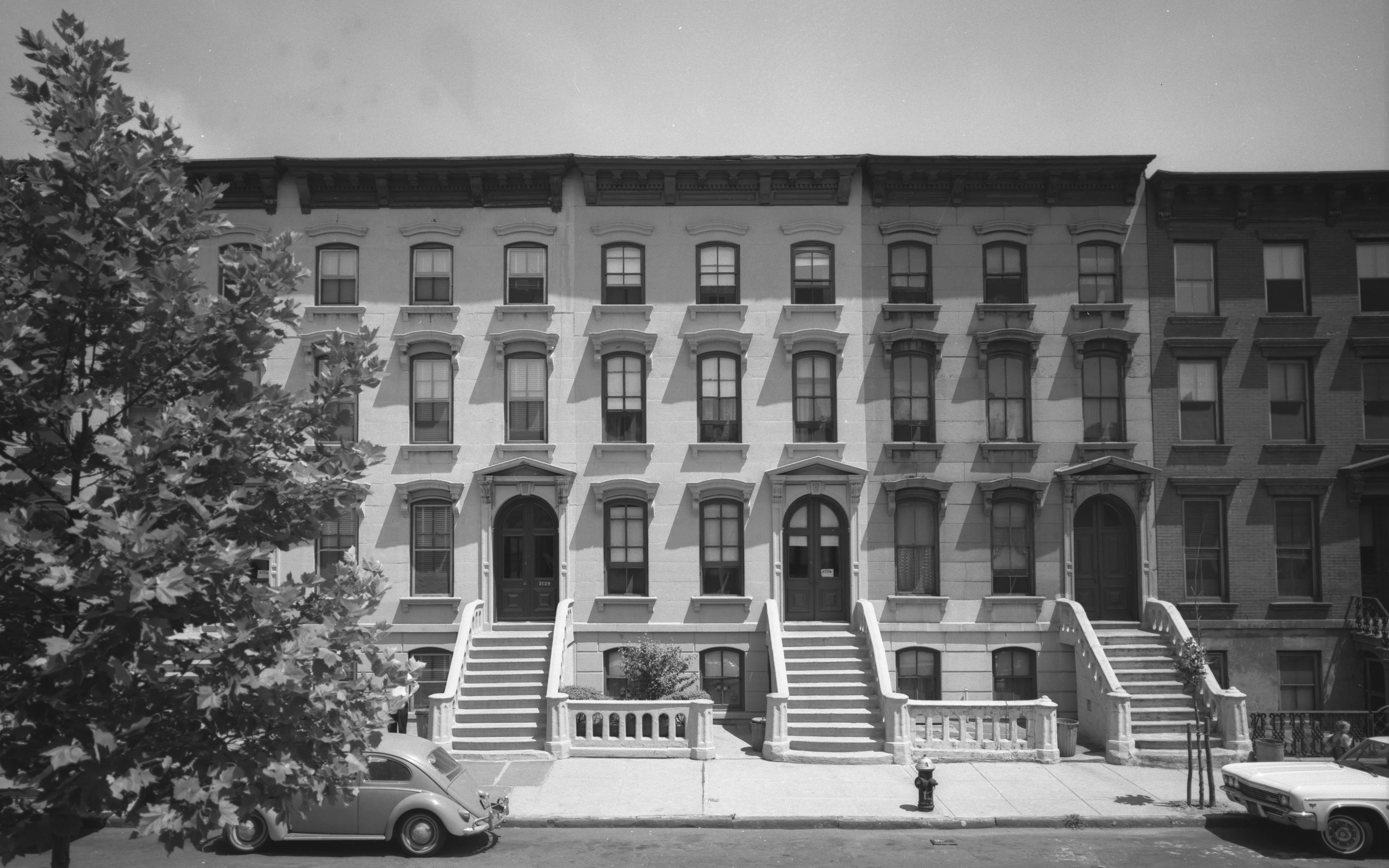Rowhouse Playing Cards
Featuring fifteen watercolor illustrations by Diane Hu, the Rowhouse Playing Cards are a celebration of New York City’s vast treasury of historic rowhouses.

Hunters Point Historic District, 1966. (Landmarks Preservation Commission.)
The Rowhouse Playing Cards are a celebration of New York City’s vast treasury of historic rowhouses. Featuring original watercolor illustrations by Diane Hu, these playing cards depict houses in Brooklyn, Manhattan, Queens, and The Bronx. The cards were designed by Peacham and were produced by architecture firm The Brooklyn Studio in collaboration with the Historic Districts Council.
The Historic Districts Council (HDC) is the citywide advocate for New York’s neighborhoods. HDC works to ensure the preservation of architecturally, historically, and culturally significant places in New York City.

Ethan Herrington

Ethan Herrington
“These playing cards are a tribute to New York City’s rich architectural heritage,” says Brendan Coburn, FAIA, founding partner at The Brooklyn Studio, New York City’s leading rowhouse architecture firm. “The deck showcases the diverse architectural styles that define our city’s streets. Each hand dealt is an opportunity to reflect on the importance of preserving New York’s historic fabric for future generations.”

Renaissance revival rowhouses in Park Slope, Brooklyn. Tax photo, c. 1940. (New York City Municipal Archives.)

Federal rowhouse in Brooklyn Heights. Tax photo, c. 1940. (New York City Municipal Archives.)

Moorish Revival rowhouses on the Upper West Side. Tax photo, c. 1940. (New York City Municipal Archives.)

Renaissance revival rowhouses in Park Slope, Brooklyn. Tax photo, c. 1940. (New York City Municipal Archives.)

Federal rowhouse in Brooklyn Heights. Tax photo, c. 1940. (New York City Municipal Archives.)

Moorish Revival rowhouses on the Upper West Side. Tax photo, c. 1940. (New York City Municipal Archives.)
Illustrated by Diane Hu
The Rowhouse Playing Cards feature fifteen original watercolor paintings by artist Diane Hu. The paintings are based on some of The Brooklyn Studio’s favorite rowhouses throughout the city, and they display a variety of architectural styles, ranging from Federal and Greek Revival to Neo-Tudor and Flemish Renaissance.
Hu specializes in small-scale watercolors of New York rowhouses, which she has been painting since 2018. She is inspired by the city’s abundance of historic buildings and its diversity of architectural styles. “I was delighted to partner with The Brooklyn Studio on this project,” says Hu. “These playing cards are a wonderful culmination of the five years that I have spent immersed in the charming world of New York City’s rowhouses.”

Ethan Herrington

Ethan Herrington
Typography by Frere-Jones Type
The Rowhouse Playing cards are typeset in Community Gothic, a font by Frere-Jones Type. Community Gothic is inspired by nineteenth-century jobbing type — nondescript fonts that were used for quick, inexpensive, commercial print jobs. Its letterforms have slightly irregular curves, echoing the imperfections of nineteenth-century print. Peacham enlisted type designer Tobias Frere-Jones to design an accompanying set of playing suits — clubs, diamonds, hearts, and spades — to pair with Community Gothic.








“There is a remarkable parallel between Community Gothic and New York City rowhouses,” says Christopher Devine, Peacham’s Creative Director. “Today, we tend to romanticize rowhouses, but their design and construction were rooted in utility. The rowhouse is New York’s vernacular architecture. Community Gothic was created in a similar spirit: it celebrates the ordinary, utilitarian letterforms that characterized nineteenth-century print culture.”
The card backs feature a Flemish Bond brick pattern, which was a popular bricklaying technique in the early decades of the nineteenth century. The pattern was created using punctuation marks from Community Gothic, specifically hyphens and en-dashes. The asymmetrical borders, barely perceptible to the naked eye, evoke the organic warmth of molded brick.

Ethan Herrington
The cards are printed on premium paper stock, and are designed to meet the needs of enthusiasts, collectors, magicians, and professional card-players alike. They were produced in a limited edition of 1,000 decks, and were sold on The Brooklyn Studio’s webshop. Proceeds from the sale of each deck benefitted Historic Districts Council.
The Rowhouse Playing Cards were featured in Print Magazine, Brownstoner, and the Brooklyn Paper.
Notes and References
The Historic Districts Council (HDC) is the citywide advocate for New York’s neighborhoods. HDC works to ensure the preservation of architecturally, historically, and culturally significant places in New York City.
Project Credits
Illustrated by Diane Hu
Produced by The Brooklyn Studio
Produced in collaboration with Historic Districts Council
Custom typography by Frere-Jones Type
Product Photography by Ethan Herrington
Designed by Peacham
Project Credits
Illustrated by Diane Hu
Produced by The Brooklyn Studio
Produced in collaboration with Historic Districts Council
Custom typography by Frere-Jones Type
Product Photography by Ethan Herrington
Designed by Peacham